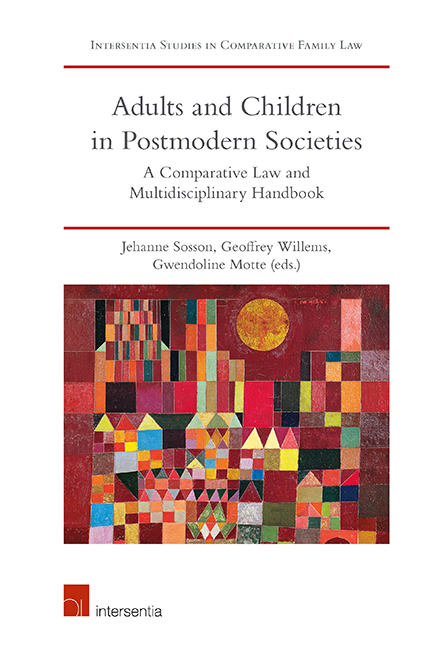Book contents
- Frontmatter
- Contents
- List of Cases
- List of Contributors
- Introduction
- PART I NATIONAL REPORTS ON LEGAL REGULATIONS OF RELATIONSHIPS BETWEEN ADULTS AND CHILDREN
- Questionnaire
- Models
- Algeria
- Argentina
- Australia
- Belgium
- Canada
- Democratic Republic of the Congo
- England and Wales
- France
- Germany
- Ireland
- Italy
- Japan
- The Netherlands
- Romania
- Spain and Catalonia
- Sweden
- Switzerland
- United States of America
- PART II INTERDISCIPLINARY APPROACH
- PART III INTERNATIONAL LAW INSIGHTS
- PART IV COMPARATIVE APPROACH
- General Conclusion: The Challenge of Transparent and Inclusive Parenthood/Parentality in a Pluralist and Cosmopolitan Context
- About the Editors
Switzerland
from PART I - NATIONAL REPORTS ON LEGAL REGULATIONS OF RELATIONSHIPS BETWEEN ADULTS AND CHILDREN
Published online by Cambridge University Press: 26 June 2019
- Frontmatter
- Contents
- List of Cases
- List of Contributors
- Introduction
- PART I NATIONAL REPORTS ON LEGAL REGULATIONS OF RELATIONSHIPS BETWEEN ADULTS AND CHILDREN
- Questionnaire
- Models
- Algeria
- Argentina
- Australia
- Belgium
- Canada
- Democratic Republic of the Congo
- England and Wales
- France
- Germany
- Ireland
- Italy
- Japan
- The Netherlands
- Romania
- Spain and Catalonia
- Sweden
- Switzerland
- United States of America
- PART II INTERDISCIPLINARY APPROACH
- PART III INTERNATIONAL LAW INSIGHTS
- PART IV COMPARATIVE APPROACH
- General Conclusion: The Challenge of Transparent and Inclusive Parenthood/Parentality in a Pluralist and Cosmopolitan Context
- About the Editors
Summary
Switzerland is a federal state consisting of 26 sovereign cantons. However, the cantons'sovereignty is limited by the Federal Constitution (Bundesverfassung). According to the constitution, the confederation is responsible for legislation in the field of civil law and civil procedure law. Consequently, the legislator created the Swiss Civil Code (Schweizerisches Zivilgesetzbuch), which is to a great extent influenced by the German and French Civil Codes and has been in force since 1912. The Swiss Civil Code consists of four parts: law of persons, family law, law of succession and property law.
Though major adaptations were made since 1912, traditional values continue to prevail within the legislation. These values are still reflected in many areas of Swiss family law. Gradually, the Civil Code is being adjusted to the changes that society has undergone. Even though the Swiss legal system is based on the civil law tradition, judicial discretion of courts, especially of the Swiss Federal Supreme Court (Schweizerisches Bundesgericht), plays an important role.
CHANGES IN THE TRADITIONAL FAMILY
A. MOTHERS
1. Is maternity automatically established by the birth certificate?
The mother is the woman who gives birth to the child. Following the Roman principle of mater semper certa est, maternity is automatically established through the act of giving birth (Art. 252 para. 1 Swiss Civil Code, CC; Schweizerisches Zivilgesetzbuch).
Every birth must be reported (Art. 35 para. 1 Civil Status Ordinance, Zivilstandsverordnung, ZStV) and will be recorded in the civil register (Personenstandsregister). The civil register holds the following information concerning birth: place, day and time of birth, name of the child, name of the mother, and of the child's father, if known (cf. Q. 5 ff.).
For maternity established by adoption cf. Q. 31 ff.
2. Does your jurisdiction recognise any kind of ‘anonymous childbirth’?
No, anonymous childbirth is not recognised by Swiss law. It cannot be admissible because of the constitutional right to know your own filiation. Therefore, a woman cannot give birth in a Swiss hospital without disclosing her identity. Hospitals are legally bound to report every birth within three days (Art. 34 lit. a, 35 para. 1 ZStV).
- Type
- Chapter
- Information
- Adults and Children in Postmodern SocietiesA Comparative Law and Multidisciplinary Handbook, pp. 551 - 582Publisher: IntersentiaPrint publication year: 2019

